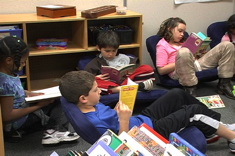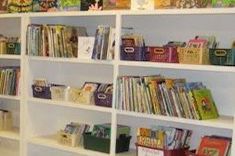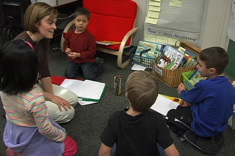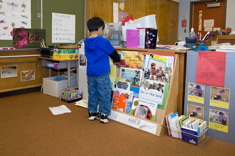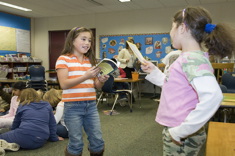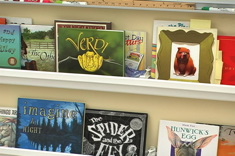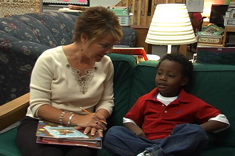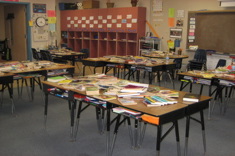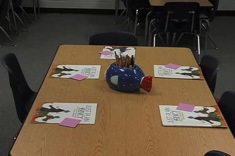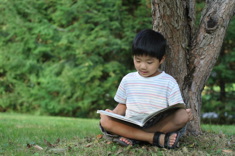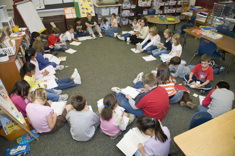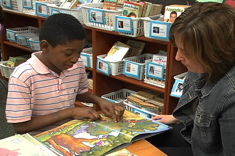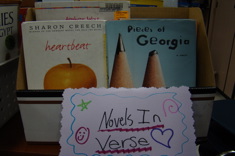Teaching Reading
Our contributors lead reading workshops in classrooms with creative flair. Over the past 12 years, we've filled our site with loads of suggestions, tools, and tips for using engaging books throughout the curriculum to hook kids on reading. Here is where you will find many stories of successful and not-so-successful workshop days, and what we learned from them. We bring these stories to life through hundreds of video examples.
Latest Content
Teaching Economics with Children’s Literature
Mandy Robek shares some of her favorite children’s books for teaching economics.
Bucking Broncs and Spitting Bulls
Andie Cunningham finds a rodeo reminds her of the opening days of school, and how timed assessments can cloud our vision of students early in the year.
Animals as Ambassadors: Using Class Pets to Reach an English Language Learner
When a student is struggling, language barriers can make it even harder for teachers to connect. Andrea Smith finds webbing during conferring is an excellent strategy for assisting a young English language learner in her writer's workshop.
Community First: Using Read Alouds to Strengthen Classroom Connections
Mary Lee Hahn plans her read alouds for double duty, using them to build the community and a love of reading.
The Draw-a-Reader Test: Informal Assessment Supporting Teacher Inquiry
The Draw-a-Reader test from Suzy Kaback is a fun way to get to know the readers of any age that also provides insight into their background knowledge and personal reading histories.
Questions and Answers about Home Reading Logs
Readers enjoyed Mandy Robek’s explanation of her move to home reading logs in a calendar format, and some wrote in with additional questions about the program. Mandy provides a follow-up article in a question and answer format, addressing issues raised by readers.
A Workshop Model in the Library: Time for More Than Book Checkout
Franki Sibberson shares ideas for library browsing baskets, as well as ways to integrate minilessons into the school library routine.
Step by Step: Integrating Nonfiction into Primary Classroom Instruction
Nonfiction texts require different reading skills than fiction, and you can’t introduce nonfiction genres to children too early. Katie DiCesare shares how she moves between whole-class, small-group, and individual instruction to help all her first graders master the text features in nonfiction.
Multicultural Books for Beginning Readers
“Why isn’t there an African American Henry and Mudge?” asks a teacher. This question leads Shari Frost on a quest to find the best early readers for multicultural students. In this booklist, she highlights her top picks.
Easing into Assessments During the First Six Weeks of School
Franki Sibberson and Karen Szymusiak have suggestions for integrating observations and assessments of students naturally into reader's workshops during the first six weeks of school.
New Versions of Old Favorites (BOOKLIST)
Recently there has been less interest in retelling of classic tales by children’s book authors. Franki Sibberson’s booklist highlights some of the best new twists on favorite children’s stories.
Characters We Love (BOOKLIST)
Nothing hooks kids on books more than a favorite character. Franki Sibberson presents some series books with intriguing characters that will delight your students.
Inspiration from Author Visits: Tips and Web Resources
Jennifer Jones reflects on the power of a local author visit in her school, and also provides some quick tips and weblinks for planning a visit.
Conferring with Children: Principles and Procedures
“The Sisters” (Gail Boushey and Joan Moser) share their principles and procedures for conferring in the classroom.
A Tornado of Books
By upending the classroom library and asking students to sort and reorganize it, Karen Terlecky gets insight every year into the ways students categorize texts, as well as their emerging understanding of genre.
Books to Get Us Ready for Summer Vacation
Franki Sibberson finds preparing students for summer reading is a little different this year, now that she has moved from classroom teaching to work in the school library. Here are some terrific books to get students excited about summer.
Ready for Guided Reading?
Shari Frost writes about the “Level A Purgatory” many kindergartners and young students endure when teachers assign reading groups too early. Her feature includes other instructional options beyond small groups for early in the year that may be more appropriate for our youngest learners.
Talking with Parents about Text Difficulty
Clare Landrigan and Tammy Mulligan write about how to share the research base and goal of producing lifelong readers with families in understandable terms. The article includes a handout to share at parent meetings.
Going from the Known to the Unknown: Vacation Reflections on Fluency
Jennifer Jones uses her experience as a tourist in a Spanish-speaking country to consider how fluency and meaning are (and aren't) connected, and what that means for teaching students.
Sharing Our Lives as Readers with Our Students
Students look to us as model readers. Franki Sibberson explains how a quick explanation of your habits and preferences can be a wonderful start to year-long conversations.
Build Fluency with Books That Are Fun for Kids to Read Aloud Over and Over and Over Again
Here’s a booklist of delightful titles that will build fluency skills for students — both as read alouds, and during independent reading.
Reflections on Our Year of Read Alouds (BOOKLIST)
if you're moving from thinking about read alouds for the first days of school, to plotting out a plan for read alouds all year long, you might want to read Franki Sibberson's booklist of read-alouds used for the entire year with her 3rd and 4th grade students.
Looking for Evidence: Seven Questions
With all the things teachers could focus on in their observations of students, what are the key behaviors to look for in assessing literacy growth and development? Ruth Shagoury notes the questions she uses to focus her observations and assessment of student comprehension of texts.
Student Independence and Ownership in the Library
The “status of the class” form is a tool used by many teachers in reading and writing workshops to chart student plans daily. As Franki Sibberson tests out a status form in the school library, she discovers it has more value than she realized.
Getting the Most Out of Picture Books
If you are a fan of Mo Willems’ picture books (and who isn’t?), you’ll enjoy Katie DiCesare’s ideas for integrating his popular stories throughout the literacy curriculum. From read-alouds to mentor texts, these books are wonderful tools for engaging students.
Supporting Readers During Workshops: The First Few Weeks
Katie DiCesare ponders the different ways students need to be supported in her primary classroom during the early days of the school year.
What My Son’s Reading Difficulties Taught Me About Teaching Struggling Readers
No matter how many education methods courses and professional development workshops you take, if you’re a parent, your children will always teach you the most about how students learn. Tammy Mulligan shares three practical strategies for reaching struggling readers that she learned from experiences with her son.
Novels in Verse (BOOKLIST)
Franki Sibberson provides a booklist of "novels in verse" – a genre intermediate readers enjoy, especially those who struggle with longer texts.
Models, Coaches, Shepherds, or Rock Stars? Our Reading Roles in the First Few Weeks of School
Cheerleader? Shepherd? Rock Star? Coach? Andrea Smith considers her changing reading “roles” early in the school year as she tries to build a classroom community that shares her passion for literacy.
Wide Open Spaces: Learning from “Not-Just-Right” Books
When is it okay for a child to read a "not-just-right" book, especially one with themes that might be a bit sophisticated or of questionable taste? Andrea Smith confronts this issue as a parent, and thinks through what it might mean for her teaching.
Browse Content By
Type
Category
- Assessment Tools
- Big Fresh Archives
- Booklists
- Choice Numeracy
- Classroom Design
- Common Core
- Community Building
- Conferring
- Content Literacy
- Digital Literacy
- English Language Learners
- Equity
- Family Relations
- Free Samples
- Guiding Groups
- Leadership
- Literacy Coaches
- Mentor Texts
- Minilessons
- New Teacher Mentors
- Podcasts
- Poetry
- Quote Collections
- Reading Strategies
- Self Care
- Struggling and Striving Learners
- Talking and Listening
- Teacher Study Groups
- Teaching Reading
- Teaching Writing
- Word Study and Vocabulary
Author
- Melissa Quimby
- Nawal Qarooni
- Gwen Blumberg
- Julie Cox
- The Lead Learners
- Hannah Tills
- Josie Stewart
- Ruth Metcalfe
- Mallory Messenger
- Becca Burk
- Jodie Bailey
- Vivian Chen
- Mary Brower
- Tiffany Abbott Fuller
- Stephanie Affinito
- Ruth Ayres
- Leigh Anne Eck
- Heather Fisher
- Shari Frost
- Julie Johnson
- Suzy Kaback
- Gigi McAllister
- Shirl McPhillips
- Melanie Meehan
- Cathy Mere
- Debbie Miller
- Tara Barnett and Kate Mills
- Tammy Mulligan
- Dana Murphy
- Bitsy Parks
- David Pittman
- Brenda Power
- Heather Rader
- Matt Renwick
- Mandy Robek
- Christy Rush-Levine
- Gretchen Schroeder
- Jen Schwanke
- Brian Sepe
- Katherine Sokolowski
- Stella Villalba
- Jennifer Vincent
Grade Level
Choice Literacy Membership
Articles
Get full access to all Choice Literacy article content
Videos
Get full access to all Choice Literacy video content
Courses
Access Choice Literacy course curriculum and training





